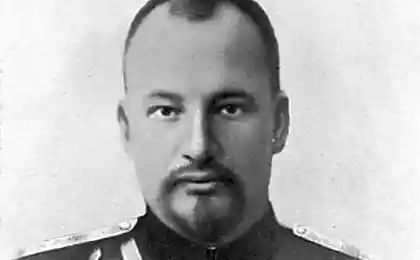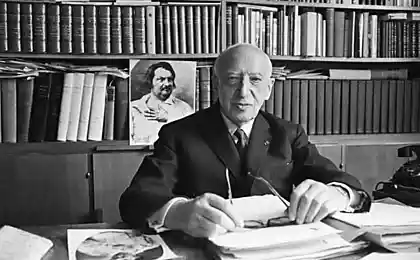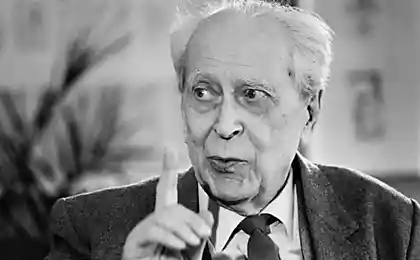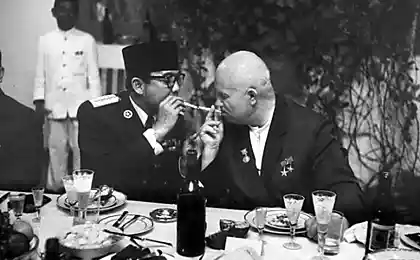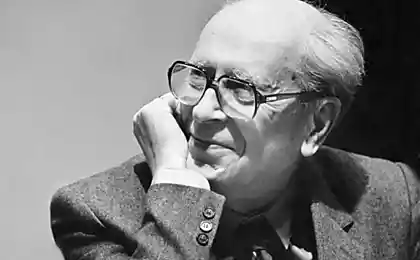913
Dmitry Sergeevich Likhachev: take care of the youth to a ripe old age!
In my entire life, Soviet scholar Dmitry has written more than 1,000 articles left about 500 scientific and about 600 publicistic works. Including more than 40 books on the history of old Russian literature and Russian culture. But one of the most interesting and valuable books Likhachev is the book-will: "Letters about the good and the beautiful."
These "letters" (46 letters) addressed to the young who have yet to learn life, to go its complex ways. Today is the most authoritative collection of wisdom. This book translate in different countries, translated into many languages.
Excerpts from these letters-tips I want to share with you:
Thirteen million six hundred thirty nine thousand one hundred ninety four
1. Large in the small.
The saying "the end justifies the means" destructive and immoral. It has shown Dostoevsky in "Crime and punishment". The protagonist of this work – Rodion Raskolnikov thought, killing the nasty old rastovich, he will produce money, which can then achieve great goals and to benefit humanity, but suffers internal collapse.
The goal is distant and unattainable, and the crime is real; it is awful and cannot be justified. To strive for high goals low means can not. We must be equally honest with both large and small.
2. Take care of the youth.
True friends are acquired in your youth. I remember that my mother's real friends were only her friends at school. My father friends were his fellow students at the Institute. And I watched, openness to friendship gradually declines with age.
Youth is a time of convergence. And keep this in mind and friends to protect, because true friendship is very helpful in sorrow and in joy. Joy, too, need help: help to feel happiness deeply, to feel and share it.
Unshared joy is not a joy. Man spoils the happiness when he experiences it himself. When will come the time of tribulation, a time of loss – again, it is impossible to be alone. Woe to the man, if he is one.
So take care of youth to a ripe old age. Appreciate all the good that is acquired at a young age, do not waste the wealth of youth. Nothing purchased in my youth does not go unnoticed. Habits educated in youth persist for life. Skills to work – also. Accustomed to the work will always bring joy. And how important it is for human happiness! No unhappy person lazy, always avoiding work, effort,…
In youth and in old age. Good skills of youth make life easier, bad – complicate it and make it more difficult.
And more. There is a Russian proverb: "take Care of the honor of his youth." Remain in memory all the deeds committed in his youth. Good are good, bad do not give to sleep.
3. The biggest goal of life.
And what is the biggest goal of life? I think, to increase the goodness around us. And good is first of all happiness of all the people... Much like I've said, starts out small, begins in childhood and close. The child loves his mother and father, brothers and sisters, your family, your home.
Gradually expanding, his attachment apply to the school, village, town, their entire country. This is a great and deep sense, although we cannot stop here and need to love a person.
Need to be a patriot, not a nationalist. No need to hate each others family because I love my. No need to hate other people, because you're a patriot. Between patriotism and nationalism is a profound difference. In the first – the love of his country, the second – a hatred of all others.
A big goal of good starts small – with the desire for the good of your family, but, expanding, it captures a broader range of issues. It's like circles on the water. But the ripples, expands, and becoming weaker. Love and friendship, growing and spreading on many things, gain new power, becoming higher and man, their center, wiser.
Love shouldn't be instinctive, it must be smart. This means that it must be connected with the ability to notice flaws, to deal with imperfections in a loved one, and other people. It should be connected with wisdom, with the ability to separate the essential from the empty and false. It should not be blind.
Blind enthusiasm (it even can not be called love) can lead to dire consequences. Mother, everyone admires and encouraging your child, can raise a moral monster. The blind admiration of Germany ("Germany above all" – the words of the chauvinistic German songs) led to Nazism, blind admiration for Italy is to fascism.
4. The greatest value is life.
"Inhale – exhale, exhale!"To breathe, had to breathe. First of all, learn to breathe, to get rid of the "exhaust air".
Life is first and foremost a breath. "Soul" "spirit"! Died and – above all – "stopped breathing". Thought so from time immemorial. "The spirit won!"– it means "dead".
"Stuffy" is in the house "stuffy" and in the moral life. Thoroughly exhale all petty worries, all the fuss of everyday life, to get rid of, to shake off all that constrains the movement of thought that presses the soul, does not allow a person to take on life, her values, her beauty. People should always think about the most important for themselves and for others, throwing himself all empty care.
You have to be open to people, tolerant people, look at them better. The ability to search and find the best, just "good", "hidden beauty" enriches the human spirit. To notice the beauty in nature, in the village, town, street, not to mention in man, through all barriers of things – it means to widen the sphere of life, sphere of the life space in which man lives.
The biggest value in the world – life: alien, its, life, animal world and plant life culture, life in its entirety – both in the past and in the present and in the future... And life is infinitely deep. We always meet with something which had not been noticed before, that strikes us with its beauty, unexpected wisdom, and originality.
5. Vital goal.
For what man lives, can be judged and self-esteem – low or high.
If the person aims to acquire all the basic material goods, he evaluates himself on the level of wealth: as the owner of the car's latest brand, as the owner luxury villas as part of your furniture set…
If a person lives to bring people to alleviate their suffering under the disease, to give joy to people, he evaluates up to this his humanity. He set himself a goal worthy of man.
Only vital goal allows a person to live his life with dignity and to true joy. Yes, the joy! Think about it: if a man sets himself the task to increase good, to bring happiness to people, which a failure to grasp?
If you're a doctor, you may be supplied a patient the wrong diagnosis? It happens in the best doctors. But the amount you did help more than not help. From errors nobody is insured. But the main error, fatal error – wrong choice the main goal in life.
Not promoted – disappointment. Don't have time to buy a stamp for your collection – a disappointment. Someone better than you, the furniture or the best car – again, frustrating and then some.
Setting themselves the task of career or acquisitive, a person experiences the amount of a lot more grief than joy, and risks losing everything. And that may lose people, who rejoiced in every good work? It is important that the good that man does, who would be his inner need, was from an intelligent heart and not just from the head, there would be only one "principle".
Therefore, the main life task is to be sure the task is broader than just personal, it should not be closed just for their own successes and failures. She must be as kind to others, love of family, his city, his people, country, to the entire universe.
Does this mean that man should live as an ascetic, not to take care of yourself, nothing to buy and not to enjoy the simple promotion? Far from it! The person who does not think about himself – a phenomenon abnormal and unpleasant to me personally: there is some breakdown, some ostentatious exaggeration of their kindness, of selflessness, of significance, there is some kind of contempt for other people, the desire to stand out.
So I'm talking only about main life task. And this main life task is not necessary to emphasize in the eyes of other people. I must dress well (this is respect for others), but not necessarily "better than others". And the library itself need to be, but not necessarily greater than the neighbor. The car is good to purchase for yourself and family is convenient. Don't turn the secondary into the primary and don't need to main goal of life is exhausting you where it's not needed. When needed – is another matter.
6. What brings people together?
Floors care. Concern binds relationships between people. Family bonds, bonds of friendship, bonds of residents of one city, one country.
Follow the life of a person. Man is born, and the first care – mother; gradually (a few days) comes into direct contact with the child care of father (before birth care have been, but was to a certain extent abstract – the emergence of the child's parents were preparing for, dreamed about it).
The sense of caring about the other appears very early, especially in girls. The girl does not speak yet, but already trying to take care of the doll, nursing it. Boys, very young, love to collect mushrooms, to fish. Berries, mushrooms love to collect and girls. And because they collect not only for themselves but for the whole family. Take it home, prepare for the winter.
Concern is growing and becoming more altruistic. For caring for yourself kids pay care for the elderly-parents when they can't pay for the care of children. And this caring for the elderly, and then the memory of the deceased parents as it merges with the care of the historical memory of family and homeland as a whole.
If the concern is directed only at yourself, then grow selfish.
Eighty million five hundred fifty seven thousand five hundred forty
Care brings people together, strengthens the memory of the past and focuses entirely on the future. This is not the feeling itself is a concrete manifestation of feelings of love, friendship and patriotism. People should be careful. Uncaring or careless people – most likely an evil person and not loving anyone.
Morality in the highest degree peculiar sense of compassion. Compassion is a consciousness of their unity with mankind and the world (not only Nations, but also with animals, plants, nature, etc.). A sense of compassion (or something close to it) forces us to fight for the monuments of culture, their preservation, for nature, private landscapes, respect to the memory. Compassion is a consciousness of their unity with other people, nation, people, country, universe. That is why the forgotten concept of compassion requires its complete revival and development.
Surprisingly the right idea: "a Small step for man, one giant leap for mankind." You can give thousands of examples of this: be kind to one person is worth nothing but to be good to mankind is incredibly difficult.
To correct mankind cannot fix themselves – just. To feed the child, through the street the old man, to give way to the tram, work hard, be polite and courteous... etc. etc.-all this is easy for a human but incredibly difficult for all of them. That's why you need to start with yourself.
Good cannot be stupid. A good deed is never stupid, because he is selfless and is not intended to benefit, and "smart." To call good act "stupid" when he clearly couldn't achieve the goal or was "ludorum" mistakenly good, that is not good. Again, a true good deed can not be stupid, he is out assessments from the perspective of mind or not mind. The good and good.
7. about education
To obtain a good education not only in his family or school, but also... himself. You just need to know what a real education.
I am not going to give "recipes" education, as he itself is not considered exemplary well-mannered. But some thoughts I wanted to share with readers.
I am convinced, for example, that real education occurs primarily at home, in your family, in relationships with their loved ones.
If the man on the street pass first an unknown woman (even on the bus!) and even opens the car door for her, and the house will not help a tired wife to wash the dishes, is it rude man.
If with friends he is polite, but homemade is irritated on each occasion – he is rude man.
If he's not a character, psychology, habits and desires of their loved ones – they are ill-mannered people. If you are already in adulthood he takes for granted the help of the parents and does not see that they have need of help, he is rude man.
If he gets loud radio and TV or simply talking loudly when someone is at home preparing lessons or reading (let it be even his little children) – he's a rude person and will never be brought up their children.
If he likes to trunity (joke) over the wife or kids, not sparing their pride, especially in front of strangers, then there is it (excuse me!) is just silly.
Educated person is someone who wants and knows how to reckon with the other, is the one who own politeness is not only familiar and easy, but also enjoyable. Is someone who is equally polite and with his older and younger years.
The reader will have noticed probably that I am referring mostly to male, the head of the family. This is because the woman really need to give way... not just in the door.
But a smart woman will easily understand what to do to always taking note with appreciation of the man given to her by the nature of the right as little as possible to get a man to give her the championship. And it is much harder! That is why nature made sure that women for the most part (I'm not talking about exceptions) was endowed with great tact and more natural politeness than men…
There are many books about "good manners." These books explain how to behave in society, home and away, in the theater, at work, with senior and Junior how to speak without offending the ear, and to dress without offending the vision of others. But people, unfortunately, little draw of these books. It happens, I think, because in the books about good manners rarely explains why you need good manners. Seems: to have good manners out of tune, boring, unnecessary. People good manners and can really cover up bad deeds.
Yes, good manners can be very external, but in General the good manners established by the experience of many generations and represent a centuries-old desire of people to be better, life easier and prettier.
Educated people are not behaving in a loud, saves time of others ("punctuality is the politeness of kings" – says the proverb), and is complying with the data other promises, not condescending, not "nose" and always the same – at home, at school, in College, at work, in the store and on the bus.
What's the matter? What is the basis of leadership for the acquisition of good manners? The basis of all good manners is the concern-the concern that people do not interfere with the person so that the whole would feel good. To be able not to interfere with each other. So no need to make noise. From noise ears – this is unlikely in all cases possible. For example, at the table during meals.
So no need to slurp loudly is not necessary to put the fork on the plate with the noise to involve soup, talking loudly at dinner or talking with your mouth full, so the neighbors had no concerns. And don't put your elbows on the table – again so as not to disturb the neighbor. To be dapper is necessary because this affects the respect for others – to guests, to the owners or just passers-by: you should not be disgusting to watch.
It is not necessary to bore the neighbours incessant jokes, witticisms and anecdotes, especially those that already had someone told your listeners. You put students in an awkward position. Try to not only entertain others but also let others to say something.
Irina Khakamada: If a man does not want to change, you have a choiceBest motivational phrase length to 3 words
Manners, clothing, gait, all behavior must be restrained and beautiful. Because any beauty is not tiring. It is "social". In the so-called good manners is always a deeper meaning. Do not think that good manners are just manners, something superficial.
Their behavior you reveal its essence. To cultivate is not so much manners as it is reflected in manners, respect for the world: to society, to nature, to animals and birds, to plants, to the beauty of the countryside, to the past of the places where they live, etc. is not Necessary to memorize hundreds of rules, but remember one thing – respect for others.published
Source: moiarussia.ru/dmitrij-lihachev-zaveshhanie-potomkam/
These "letters" (46 letters) addressed to the young who have yet to learn life, to go its complex ways. Today is the most authoritative collection of wisdom. This book translate in different countries, translated into many languages.
Excerpts from these letters-tips I want to share with you:
Thirteen million six hundred thirty nine thousand one hundred ninety four
1. Large in the small.
The saying "the end justifies the means" destructive and immoral. It has shown Dostoevsky in "Crime and punishment". The protagonist of this work – Rodion Raskolnikov thought, killing the nasty old rastovich, he will produce money, which can then achieve great goals and to benefit humanity, but suffers internal collapse.
The goal is distant and unattainable, and the crime is real; it is awful and cannot be justified. To strive for high goals low means can not. We must be equally honest with both large and small.
2. Take care of the youth.
True friends are acquired in your youth. I remember that my mother's real friends were only her friends at school. My father friends were his fellow students at the Institute. And I watched, openness to friendship gradually declines with age.
Youth is a time of convergence. And keep this in mind and friends to protect, because true friendship is very helpful in sorrow and in joy. Joy, too, need help: help to feel happiness deeply, to feel and share it.
Unshared joy is not a joy. Man spoils the happiness when he experiences it himself. When will come the time of tribulation, a time of loss – again, it is impossible to be alone. Woe to the man, if he is one.
So take care of youth to a ripe old age. Appreciate all the good that is acquired at a young age, do not waste the wealth of youth. Nothing purchased in my youth does not go unnoticed. Habits educated in youth persist for life. Skills to work – also. Accustomed to the work will always bring joy. And how important it is for human happiness! No unhappy person lazy, always avoiding work, effort,…
In youth and in old age. Good skills of youth make life easier, bad – complicate it and make it more difficult.
And more. There is a Russian proverb: "take Care of the honor of his youth." Remain in memory all the deeds committed in his youth. Good are good, bad do not give to sleep.
3. The biggest goal of life.
And what is the biggest goal of life? I think, to increase the goodness around us. And good is first of all happiness of all the people... Much like I've said, starts out small, begins in childhood and close. The child loves his mother and father, brothers and sisters, your family, your home.
Gradually expanding, his attachment apply to the school, village, town, their entire country. This is a great and deep sense, although we cannot stop here and need to love a person.
Need to be a patriot, not a nationalist. No need to hate each others family because I love my. No need to hate other people, because you're a patriot. Between patriotism and nationalism is a profound difference. In the first – the love of his country, the second – a hatred of all others.
A big goal of good starts small – with the desire for the good of your family, but, expanding, it captures a broader range of issues. It's like circles on the water. But the ripples, expands, and becoming weaker. Love and friendship, growing and spreading on many things, gain new power, becoming higher and man, their center, wiser.
Love shouldn't be instinctive, it must be smart. This means that it must be connected with the ability to notice flaws, to deal with imperfections in a loved one, and other people. It should be connected with wisdom, with the ability to separate the essential from the empty and false. It should not be blind.
Blind enthusiasm (it even can not be called love) can lead to dire consequences. Mother, everyone admires and encouraging your child, can raise a moral monster. The blind admiration of Germany ("Germany above all" – the words of the chauvinistic German songs) led to Nazism, blind admiration for Italy is to fascism.
4. The greatest value is life.
"Inhale – exhale, exhale!"To breathe, had to breathe. First of all, learn to breathe, to get rid of the "exhaust air".
Life is first and foremost a breath. "Soul" "spirit"! Died and – above all – "stopped breathing". Thought so from time immemorial. "The spirit won!"– it means "dead".
"Stuffy" is in the house "stuffy" and in the moral life. Thoroughly exhale all petty worries, all the fuss of everyday life, to get rid of, to shake off all that constrains the movement of thought that presses the soul, does not allow a person to take on life, her values, her beauty. People should always think about the most important for themselves and for others, throwing himself all empty care.
You have to be open to people, tolerant people, look at them better. The ability to search and find the best, just "good", "hidden beauty" enriches the human spirit. To notice the beauty in nature, in the village, town, street, not to mention in man, through all barriers of things – it means to widen the sphere of life, sphere of the life space in which man lives.
The biggest value in the world – life: alien, its, life, animal world and plant life culture, life in its entirety – both in the past and in the present and in the future... And life is infinitely deep. We always meet with something which had not been noticed before, that strikes us with its beauty, unexpected wisdom, and originality.
5. Vital goal.
For what man lives, can be judged and self-esteem – low or high.
If the person aims to acquire all the basic material goods, he evaluates himself on the level of wealth: as the owner of the car's latest brand, as the owner luxury villas as part of your furniture set…
If a person lives to bring people to alleviate their suffering under the disease, to give joy to people, he evaluates up to this his humanity. He set himself a goal worthy of man.
Only vital goal allows a person to live his life with dignity and to true joy. Yes, the joy! Think about it: if a man sets himself the task to increase good, to bring happiness to people, which a failure to grasp?
If you're a doctor, you may be supplied a patient the wrong diagnosis? It happens in the best doctors. But the amount you did help more than not help. From errors nobody is insured. But the main error, fatal error – wrong choice the main goal in life.
Not promoted – disappointment. Don't have time to buy a stamp for your collection – a disappointment. Someone better than you, the furniture or the best car – again, frustrating and then some.
Setting themselves the task of career or acquisitive, a person experiences the amount of a lot more grief than joy, and risks losing everything. And that may lose people, who rejoiced in every good work? It is important that the good that man does, who would be his inner need, was from an intelligent heart and not just from the head, there would be only one "principle".
Therefore, the main life task is to be sure the task is broader than just personal, it should not be closed just for their own successes and failures. She must be as kind to others, love of family, his city, his people, country, to the entire universe.
Does this mean that man should live as an ascetic, not to take care of yourself, nothing to buy and not to enjoy the simple promotion? Far from it! The person who does not think about himself – a phenomenon abnormal and unpleasant to me personally: there is some breakdown, some ostentatious exaggeration of their kindness, of selflessness, of significance, there is some kind of contempt for other people, the desire to stand out.
So I'm talking only about main life task. And this main life task is not necessary to emphasize in the eyes of other people. I must dress well (this is respect for others), but not necessarily "better than others". And the library itself need to be, but not necessarily greater than the neighbor. The car is good to purchase for yourself and family is convenient. Don't turn the secondary into the primary and don't need to main goal of life is exhausting you where it's not needed. When needed – is another matter.
6. What brings people together?
Floors care. Concern binds relationships between people. Family bonds, bonds of friendship, bonds of residents of one city, one country.
Follow the life of a person. Man is born, and the first care – mother; gradually (a few days) comes into direct contact with the child care of father (before birth care have been, but was to a certain extent abstract – the emergence of the child's parents were preparing for, dreamed about it).
The sense of caring about the other appears very early, especially in girls. The girl does not speak yet, but already trying to take care of the doll, nursing it. Boys, very young, love to collect mushrooms, to fish. Berries, mushrooms love to collect and girls. And because they collect not only for themselves but for the whole family. Take it home, prepare for the winter.
Concern is growing and becoming more altruistic. For caring for yourself kids pay care for the elderly-parents when they can't pay for the care of children. And this caring for the elderly, and then the memory of the deceased parents as it merges with the care of the historical memory of family and homeland as a whole.
If the concern is directed only at yourself, then grow selfish.
Eighty million five hundred fifty seven thousand five hundred forty
Care brings people together, strengthens the memory of the past and focuses entirely on the future. This is not the feeling itself is a concrete manifestation of feelings of love, friendship and patriotism. People should be careful. Uncaring or careless people – most likely an evil person and not loving anyone.
Morality in the highest degree peculiar sense of compassion. Compassion is a consciousness of their unity with mankind and the world (not only Nations, but also with animals, plants, nature, etc.). A sense of compassion (or something close to it) forces us to fight for the monuments of culture, their preservation, for nature, private landscapes, respect to the memory. Compassion is a consciousness of their unity with other people, nation, people, country, universe. That is why the forgotten concept of compassion requires its complete revival and development.
Surprisingly the right idea: "a Small step for man, one giant leap for mankind." You can give thousands of examples of this: be kind to one person is worth nothing but to be good to mankind is incredibly difficult.
To correct mankind cannot fix themselves – just. To feed the child, through the street the old man, to give way to the tram, work hard, be polite and courteous... etc. etc.-all this is easy for a human but incredibly difficult for all of them. That's why you need to start with yourself.
Good cannot be stupid. A good deed is never stupid, because he is selfless and is not intended to benefit, and "smart." To call good act "stupid" when he clearly couldn't achieve the goal or was "ludorum" mistakenly good, that is not good. Again, a true good deed can not be stupid, he is out assessments from the perspective of mind or not mind. The good and good.
7. about education
To obtain a good education not only in his family or school, but also... himself. You just need to know what a real education.
I am not going to give "recipes" education, as he itself is not considered exemplary well-mannered. But some thoughts I wanted to share with readers.
I am convinced, for example, that real education occurs primarily at home, in your family, in relationships with their loved ones.
If the man on the street pass first an unknown woman (even on the bus!) and even opens the car door for her, and the house will not help a tired wife to wash the dishes, is it rude man.
If with friends he is polite, but homemade is irritated on each occasion – he is rude man.
If he's not a character, psychology, habits and desires of their loved ones – they are ill-mannered people. If you are already in adulthood he takes for granted the help of the parents and does not see that they have need of help, he is rude man.
If he gets loud radio and TV or simply talking loudly when someone is at home preparing lessons or reading (let it be even his little children) – he's a rude person and will never be brought up their children.
If he likes to trunity (joke) over the wife or kids, not sparing their pride, especially in front of strangers, then there is it (excuse me!) is just silly.
Educated person is someone who wants and knows how to reckon with the other, is the one who own politeness is not only familiar and easy, but also enjoyable. Is someone who is equally polite and with his older and younger years.
The reader will have noticed probably that I am referring mostly to male, the head of the family. This is because the woman really need to give way... not just in the door.
But a smart woman will easily understand what to do to always taking note with appreciation of the man given to her by the nature of the right as little as possible to get a man to give her the championship. And it is much harder! That is why nature made sure that women for the most part (I'm not talking about exceptions) was endowed with great tact and more natural politeness than men…
There are many books about "good manners." These books explain how to behave in society, home and away, in the theater, at work, with senior and Junior how to speak without offending the ear, and to dress without offending the vision of others. But people, unfortunately, little draw of these books. It happens, I think, because in the books about good manners rarely explains why you need good manners. Seems: to have good manners out of tune, boring, unnecessary. People good manners and can really cover up bad deeds.
Yes, good manners can be very external, but in General the good manners established by the experience of many generations and represent a centuries-old desire of people to be better, life easier and prettier.
Educated people are not behaving in a loud, saves time of others ("punctuality is the politeness of kings" – says the proverb), and is complying with the data other promises, not condescending, not "nose" and always the same – at home, at school, in College, at work, in the store and on the bus.
What's the matter? What is the basis of leadership for the acquisition of good manners? The basis of all good manners is the concern-the concern that people do not interfere with the person so that the whole would feel good. To be able not to interfere with each other. So no need to make noise. From noise ears – this is unlikely in all cases possible. For example, at the table during meals.
So no need to slurp loudly is not necessary to put the fork on the plate with the noise to involve soup, talking loudly at dinner or talking with your mouth full, so the neighbors had no concerns. And don't put your elbows on the table – again so as not to disturb the neighbor. To be dapper is necessary because this affects the respect for others – to guests, to the owners or just passers-by: you should not be disgusting to watch.
It is not necessary to bore the neighbours incessant jokes, witticisms and anecdotes, especially those that already had someone told your listeners. You put students in an awkward position. Try to not only entertain others but also let others to say something.
Irina Khakamada: If a man does not want to change, you have a choiceBest motivational phrase length to 3 words
Manners, clothing, gait, all behavior must be restrained and beautiful. Because any beauty is not tiring. It is "social". In the so-called good manners is always a deeper meaning. Do not think that good manners are just manners, something superficial.
Their behavior you reveal its essence. To cultivate is not so much manners as it is reflected in manners, respect for the world: to society, to nature, to animals and birds, to plants, to the beauty of the countryside, to the past of the places where they live, etc. is not Necessary to memorize hundreds of rules, but remember one thing – respect for others.published
Source: moiarussia.ru/dmitrij-lihachev-zaveshhanie-potomkam/
How to make an octagonal gazebo with a summer kitchen with your own hands
Reveal the secret: How to achieve flowering money tree


